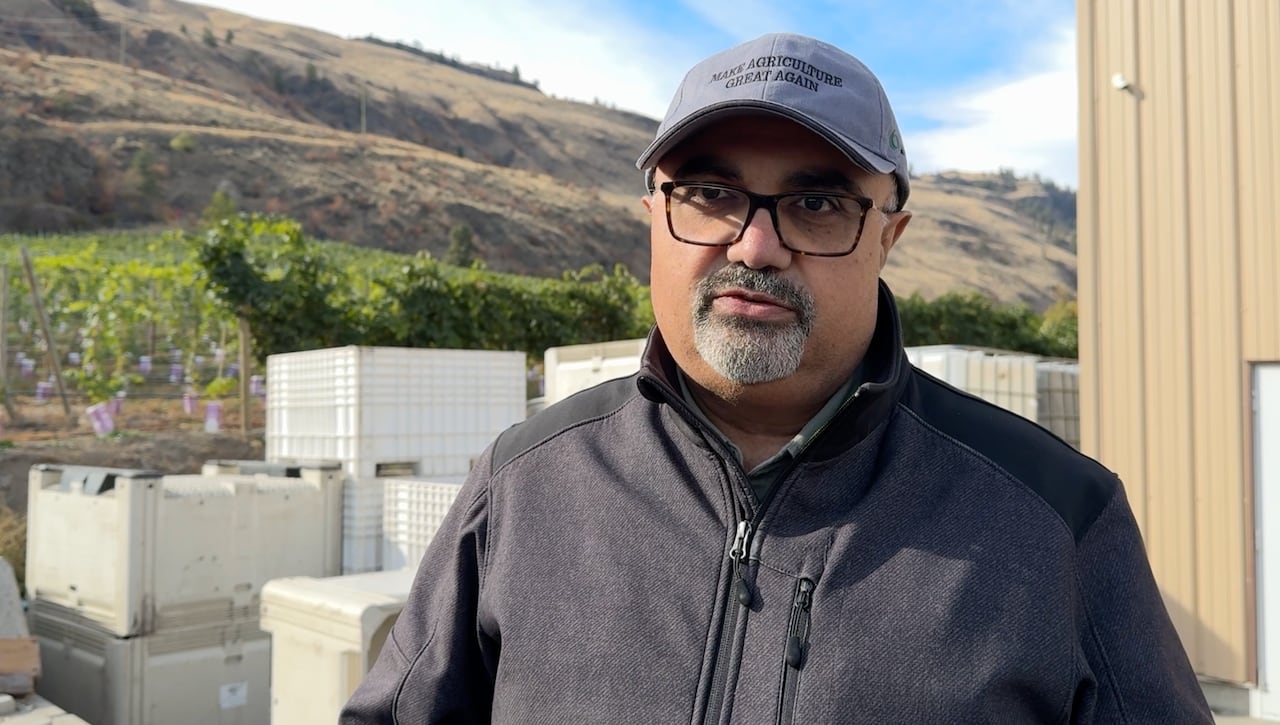In the Okanagan region of southern British Columbia, some wine grape growers are struggling to find buyers for their fruit, during a year in which many expected to make solid profits after devastating crop failures in recent years.
After two years of severe winter damage, vineyards across the region produced strong yields this season.
But some farmers say a provincial program that allows wineries to import grapes from the United States is saturating the market and leaving them with grapes they can’t sell.
Amarjeet Gill has nearly 100 tons of red wine grapes still hanging from his vines on his farm near Osoyoos, British Columbia, and says finding a winery to buy his grapes has never been more difficult.
“I talk to almost 50 wineries. I call every day,” Gill said.
“I call a lot of people to buy my grapes and they say, ‘No, I’m stuck too.'”
Despite the good quality and sugar levels, Gill said his Merlot and Cabernet Franc grapes should have been harvested two weeks ago. You are worried about making your loan payments.
“I’m very scared,” Gill said.
“How do I pay my farm payment? The banking pressure is too much for us,” he added.
Last year, a devastating cold snap wiped out 95 per cent of British Columbia’s grapes, dealing a blow to the wine industry in the Okanagan region in particular. Now, despite cooling relations between the United States and Canada, British Columbia’s wine industry has had to resort to importing grapes from American wineries, especially Washington state, to get through the season. Shiva Reddy, sommelier and On The Coast food and wine columnist, explores the reasons for optimism in BC vineyards this year.
Tank space for producers
Winery owner Jesse Gill, who is not related to Amarjeet, said he has heard similar concerns from other producers in the region.
According to Gill, the difficulties producers face in selling their harvest are related, in part, to the British Columbia government’s decision to expand the crop replacement program.
The program relaxes long-standing rules on importing and taxing wine grapes and juices from the United States and other regions.
It was introduced in 2024 after the wine industry was hit by an extreme cold snap that wiped out last year’s grape harvest and damaged vineyards across the Okanagan.
Many British Columbia-based wineries decided to import and process American-grown grapes to stay afloat, and the province extended the program again in 2025, with industry leaders citing a 10,000-tonne shortfall in grapes as the reason.

With some growers still struggling to sell their fruit, Gill questions whether expanding the program was the right decision.
“I don’t think there was any oversight done,” Gill said.
“That is the responsibility of the province. They are the ones who granted the exemption.”
Meanwhile, Gill has made room in the tank at his Back Door winery in Summerland to take in all the unsold fruit he can.
In addition to its usual capacity, the winery has secured an additional 100,000 liters of warehouse space to accommodate the grapes of just over half a dozen winegrowers.
It’s a campaign Gill has called “Save the Grapes” to prevent the fruit from spoiling.
Many British Columbia wineries imported American grapes to bolster their 2024 harvest after a cold snap wiped out vines across the Okanagan. Now, in a politically charged climate, consumers read labels carefully and are wary of new American-edition labels. CBC’s Jacqueline Gelineau has more.
The import program is not to blame: industry leader
Jeff Guignard, CEO of Wine Growers BC, believes market conditions, not the import program, are the reason some producers are struggling.
He says the crop replacement program was not expanded until late September, and that grape growers still struggling to move their product into late October could simply be at the mercy of the markets.

“The government also placed a restriction on the program so that you couldn’t grow your business while you were in it, you could only replace your losses,” Guignard said.
“I feel like the industry and government have done everything they can to encourage wineries to buy BC grapes first.”
That includes a dedicated online marketplace for producers to list their products, Guignard added.

Agriculture Minister Lana Popham declined an interview but said in a statement that the wine industry advocated for the extension because of an estimated shortage of local grapes.
He added that the program will not continue beyond this year.










